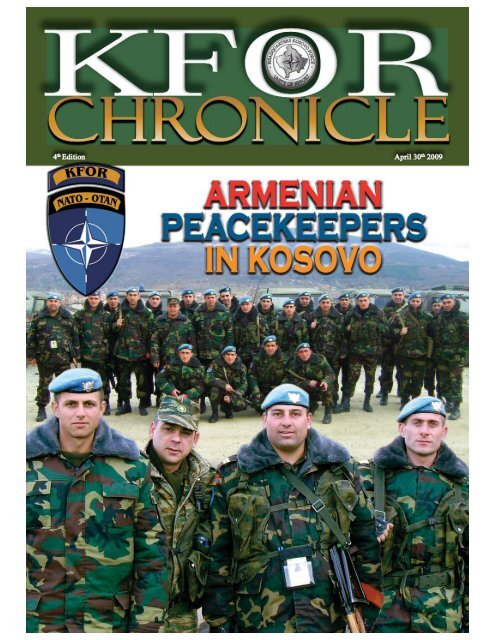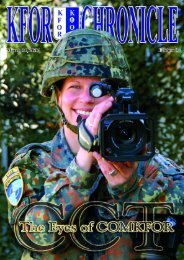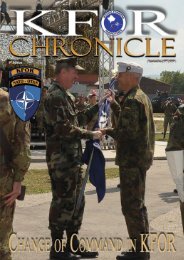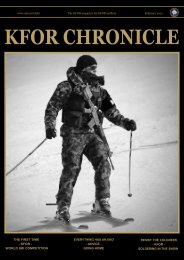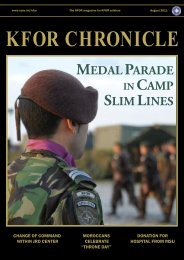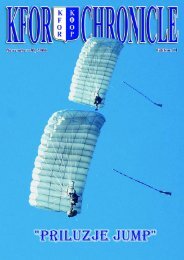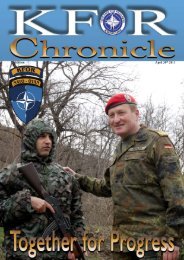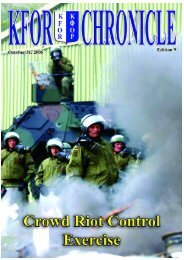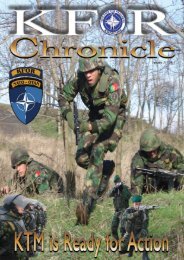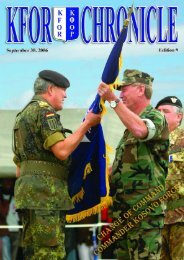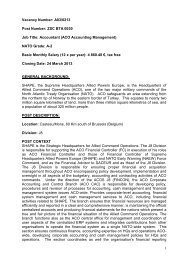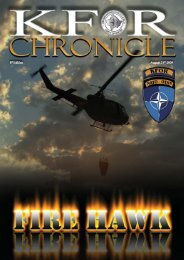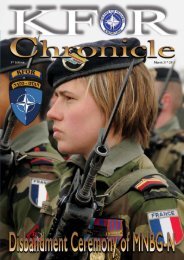April - ACO - Nato
April - ACO - Nato
April - ACO - Nato
You also want an ePaper? Increase the reach of your titles
YUMPU automatically turns print PDFs into web optimized ePapers that Google loves.
Camp Marechal de Lettres de Tassigny<br />
The 30th mandate doubly multinational!<br />
Differently from the previous French brigades that<br />
have constituted till now the frame of Task Force<br />
North, the 30th mandate is noted for the<br />
commitment of both its head quarter and the units of<br />
the French-German brigade that, daily serve and<br />
learn a multi-national mode.<br />
As a result of the initiative, in an approach of<br />
reconciliation, to gather the old enemies in the same<br />
force, the French-German brigade is now a big unit<br />
that successfully participates in operational<br />
missions. The last engagement of its Headquarter<br />
was in Afghanistan on 2005.<br />
Since January the Headquarter has been deployed in<br />
Novo Selo having under its orders the FREBAT<br />
which is composed of the FGB personals, the<br />
CSSBAT armed by France and the contingents of<br />
our allies with the Danish, the Moroccan and the<br />
Greek battalions. The cooperation with them is<br />
excellent on this sensitive area in the north of<br />
Kosovo characterized by the multiethnic city of<br />
Mitrovica and real separation line between<br />
communities.<br />
Missions are not missing and everyone is doing tasks with professionalism. Long Duration Patrols, convoy<br />
escorts, patrols in Mitrovica and the enclaves, CIMIC operations of all kinds. In this stabilizing phase the<br />
force's action is conducted in a more and more discrete way. So it is to remind the populace that the task force<br />
is present to pave the way for the security and stability conditions favourable for the return of normal life for<br />
everyone, without any distinction. In this context, the diversity of the task force's soldiers is proof of a<br />
multicultural approach favorable to the understanding of each other.<br />
Unfortunately, tension issues remain numerous and the question of returnees is now in the core of<br />
preoccupations. KFOR is, therefore, an essential and an avoidable actor so as to guarantee and maintain peace.<br />
Doubly multinational, the French-German brigade's soldiers know very well what the words reconciliation and<br />
common future mean. Having those soldiers in such a context of opposition between two communities has<br />
obviously an interesting symbolic value. What our two peoples have overwhelmed and then built together is<br />
well known, even by the Balkan people.<br />
In this way, with their allies, they will continue working for the best of the Kosovo population, certain that<br />
their efforts and their commitment for all people are not in vain.<br />
Brigadier General Philippe Bras
Commander KFOR:<br />
Lt. Gen. Giuseppe E. Gay,<br />
ITA Army<br />
Chief Public Affairs fairs Office:<br />
fice:<br />
Col. (OF-5) Stefano S<br />
Schiappacasse,<br />
ITA Army<br />
Chief Internal Infomation &<br />
Editor in Chief:<br />
Maj. (OF-3) Christian Zankl,<br />
AUT Army<br />
zanklc@hq.kfor.nato.int<br />
.nato.int<br />
Journalist<br />
Lt. Col. (OF-4) Vadym<br />
Tymoshenko,<br />
UKR Army<br />
Webmaster/Journalist<br />
TSgt. (OR-6) Libra Johnson,<br />
U.S. Air Force<br />
Layout and Design<br />
Sara Narandzic<br />
E-mail:<br />
kforchonicle@hq.kfor.nato.int<br />
.nato.int<br />
www.nato.int/kfor<br />
The KFOR Chronicle<br />
is produced and fully funded<br />
by HQ KFOR.<br />
It is published for KFOR forces in<br />
the area of responsibility.<br />
The contents are not<br />
necessarily the official ficial views<br />
of, or endorsed by, , the coalition<br />
governments’ defense<br />
departments.<br />
Editorial content is edited,<br />
prepared and provided by<br />
the Internal Information Section of<br />
HQ KFOR’s s Public Affairs fairs Office<br />
fice<br />
(PAO) in Pristina, Kosovo.<br />
PAO HQ KFOR<br />
reserves the right to<br />
edit content to conform to style and<br />
space requirements.<br />
Articles run on a<br />
space-available basis.<br />
The KFOR Chronicle is<br />
printed by RASTER<br />
Tel: 038 601 606<br />
Nations within KFOR:<br />
NATO O Nations<br />
Belgium<br />
Luxembourg<br />
Bulgaria<br />
Netherlands<br />
Canada<br />
Norway<br />
CzechRepublic<br />
Poland<br />
Denmark<br />
Portugal<br />
Estonia<br />
Romania<br />
France<br />
Slovakia<br />
Germany<br />
Slovenia<br />
Greece<br />
Spain<br />
Hungary<br />
Turkey<br />
Italy<br />
UnitedKingdom<br />
Latvia<br />
United States S<br />
Lithuania<br />
Non-NATO<br />
Nations<br />
Armenia<br />
Austria<br />
Finland<br />
Ireland<br />
Morocco<br />
Sweden<br />
Switzerland<br />
Ukraine<br />
KFOR<br />
Structure<br />
HQ KFOR<br />
MNTF Centre<br />
MNTF East<br />
MNTF North<br />
MNTF South<br />
MNTF West<br />
KTM<br />
MSU
<strong>April</strong> 1, 2009<br />
Lieutenant General Giuseppe E. Gay, Commander of KFOR,<br />
presented the KFOR Unity of Efforts Crest to Major General<br />
Jaime Dominguez Buj, the Chief of Staff of Operations for the<br />
Spanish Command Headquarters.<br />
<strong>April</strong> 2, 2009<br />
COM KFOR greeted the United Nations Mission in<br />
Kosovo (UNMIK) Chief of Staff, Mr. Robert E.<br />
Sorenson.<br />
<strong>April</strong> 3, 2009<br />
The Kosovo Force Commander had a meeting with new<br />
Chief Military Liaison Officer to UNMIK, Brigadier General<br />
Sati Bahadir Köse in KFOR Headquarters.<br />
<strong>April</strong> 12, 2009<br />
KFOR Commander Lieutenant General Giuseppe E.<br />
Gay greeted Italian soldier at Easter Celebration in<br />
Film City's Casa Italia.<br />
<strong>April</strong> 16, 2009<br />
<strong>April</strong> 16, 2009<br />
COM KFOR attended a briefing given to Heads of<br />
Missions/Representatives of Troops Contributing Nations in<br />
KFOR Headquarters' "Batcave".
<strong>April</strong> 17, 2009<br />
The Kosovo Force Commander entertained delegation of<br />
Turkish General Officers on a visit to KFOR Headquarters.<br />
<strong>April</strong> 19, 2009<br />
The Kosovo Force Commander, Lieutenant General<br />
Giuseppe E. Gay went to visit Bishop Teodosije of<br />
Lipljan, the Abbot of Decani Monastery in Decane,<br />
Kosovo during the Orthodox Easter Holiday.<br />
<strong>April</strong> 20, 2009<br />
COM KFOR greeted Admiral Tim Sloth Jørgensen, the<br />
Danish Chief of Defense in front of the KFOR<br />
Headquarters building.<br />
<strong>April</strong> 20, 2009<br />
KFOR Commander Lieutenant General Giuseppe E. Gay<br />
with Dr. Samuel Zbogar, Slovenian Minister for Foreign<br />
Affairs, during a visit to KFOR Headquarters.<br />
<strong>April</strong> 21, 2009<br />
<strong>April</strong> 21, 2009<br />
COM KFOR met Metropolitan Amfilohije, the<br />
Metropolitan of Montenegro, the Coastal lands and<br />
Skenderia and observed a tradition with Easter eggs<br />
during his visit to the Pec Patriarchate.
Story by Captain Johannes C. Moore<br />
(OF-2, US Air Force)<br />
Images: screen-captures from the<br />
aircraft's video.<br />
In order to create a safe and secure<br />
environment in Kosovo, situational<br />
awareness is critical. For commanders<br />
distant from the action, if they don't<br />
know what is occurring on the ground,<br />
any planned response by KFOR would<br />
be only a guess. One of the primary<br />
tools available to all commanders in<br />
Kosovo to obtain this awareness is the<br />
HQ J2 Branch's airborne intelligence,<br />
surveillance, and reconnaissance (ISR)<br />
platform.<br />
Although "airborne ISR" sounds<br />
impressive, in Kosovo it just involves a<br />
fleet of small contracted Cessna<br />
airplanes. However, these simple<br />
aircraft are modified with state-of-theart<br />
sensors and secure communications<br />
equipment, enabling<br />
them to roam the skies<br />
over Kosovo and<br />
provide visibility of<br />
what's happening.<br />
KFOR has contracts<br />
funded by NATO to fly<br />
hundreds of hours every<br />
month morning, noon,<br />
and night to support<br />
KFOR's mission.<br />
Although many theaters<br />
employ the use of<br />
unmanned aerial<br />
vehicles (UAVs), the aircraft used by<br />
KFOR are manned by pilots and sensor<br />
operators. The planes are capable of<br />
flying at low and high altitudes,<br />
providing flexibility to counter<br />
unforgiving terrain and weather. The<br />
aircraft have a sensor that houses both<br />
an electro-optical (EO) and infrared<br />
(IR) camera. This gives KFOR the<br />
ability to monitor target areas, activity,<br />
and personnel day or night.<br />
Additionally, the zoom capability<br />
allows us to observe targets and<br />
activities from various altitudes. This<br />
is important because airborne ISR is<br />
used for many missions:<br />
reconnaissance prior to an operation,<br />
discreetly watching people, and<br />
monitoring the Administrative<br />
Boundary Line (ABL) between<br />
Kosovo and its neighbors. Using our<br />
asset over protests, demonstrations,<br />
and other troublesome areas also gives<br />
us visibility of the "ground truth".<br />
Without knowing exactly what's<br />
happening and how many people are<br />
involved, commanders are likely to<br />
respond with too few troops or too<br />
many, which could escalate a problem<br />
rather than solve it. In this way,<br />
airborne ISR enables leaders to<br />
respond appropriately and quickly to<br />
many situations.<br />
Unlike other airborne ISR assets, our<br />
aircraft are capable of recording fullmotion<br />
video and transmitting it in<br />
real-time to KFOR HQ, where the Joint<br />
Operations Center, COMKFOR's eyes<br />
and ears, can view the video feed as<br />
events occur. After the mission, we can<br />
distribute these videos and photos via<br />
DVD to those with a need to monitor<br />
the mission. This also allows archiving<br />
for further analysis later.<br />
The J2 Imagery Intelligence (IMINT)<br />
section manages the high volume of<br />
competing requirements and has the<br />
responsibility to direct our asset to<br />
satisfy specific collection demands.<br />
Led by an American Air Force Captain<br />
(OF-2), two Greek Lieutnenants (OF-<br />
1) and a Royal Air Force (RAF) senior<br />
non-commissioned officer (SNCO),
the team prioritizes support requests using<br />
COMKFOR's Priority Intelligence Requirements<br />
(PIRs). PIRs identify critical information the<br />
Commander and staff need to understand the<br />
adversary and operational environment. Because<br />
there are more demands than aircraft available, the<br />
team often makes difficult decisions to select which<br />
requests are the most vital to COMKFOR's mission.<br />
After scheduling, our analysts (one GR OF-1 and the<br />
UK OR-6) must control the missions. Using an<br />
encrypted video downlink from the aircraft and a<br />
secure radio, the IMINT analysts direct where the<br />
aircraft goes, what it looks at, and which camera (EO<br />
or IR) to use. MNTF Liaison Officers, experts in<br />
their area of responsibility, sit with the imagery<br />
analyst to relay information between the ground<br />
forces and the analyst.<br />
For commanders who require better situational<br />
awareness, the IMINT team has several deployable kits available which include a video monitor and enough battery power to<br />
last for an entire day, permitting tactical leaders to monitor operations from a location near the target area while maintaining<br />
contact with an intelligence analyst via secure radio. These mobile ground stations allow users in a deployed command post<br />
- or even a moving vehicle - to monitor the battlespace.<br />
An airborne ISR asset provides unmatched capability; without it, a commander is literally blind to threats to his mission.<br />
Fortunately for KFOR, our Commander has a tool that provides indispensable information, and a team to exploit that<br />
information for timely, accurate intelligence. Together, they play a<br />
critical role in ensuring a safe and secure future for Kosovo.
Story by MSU G2 CHIEF,<br />
(OF1) Roberto Petraglia<br />
Photos by MSU Carabinieri<br />
The Multi-national Specialized Unit (MSU)<br />
concept dates back to 1998, when in Bosnia<br />
Gen. Wesley Clark decided to create a<br />
military force with a police background,<br />
capable to bridge the gap between<br />
conventional military forces and the civil<br />
police forces which, particularly at the<br />
beginning of the mission, are not ready to<br />
cope with major crimes or to face civil<br />
disturbances; in fact, the MSU members are<br />
both policemen and soldiers.<br />
During the years, the MSU has been deployed<br />
in Bosnia - Herzegovina, Albania, Kosovo<br />
and Iraq, always performing its duties of a<br />
military force with general police capabilities.<br />
The MSU Regiment has always been<br />
characterized by the presence of several<br />
foreigners' structures. Particularly, in Kosovo<br />
where deployed Italian Carabinieri, Estonian<br />
and French Gendarmes are. The leadership of<br />
the MSU has always belonged to Carabinieri.<br />
In 2005, Estonia withdrew its own troops<br />
from the KFOR mission; then, when the<br />
EULEX mission started, French gendarmes<br />
passed under this new mission, as also some<br />
Carabinieri units. So at present the MSU<br />
Regiment has reduced its personnel, that is,<br />
constituted just by Carabinieri, coming from<br />
territorial or mobile units in Italy, that bring<br />
their experience and capabilities in the<br />
countries where stability and peace are in<br />
danger.<br />
Unlike other Multi-national Task Forces<br />
(MNTFs), the MSU is a Kosovo-wide asset.<br />
The MSU is granted freedom of movement<br />
and free access in all areas of Kosovo in<br />
which it is tasked to operate.<br />
The MSU has a multitude of particular and<br />
specific tasks. Especially, through its Escort<br />
Team, the MSU provides escorts for military<br />
and civilian VIPs, military convoys and every<br />
unforeseen<br />
situation that<br />
requests a<br />
security framework. Escorts are often<br />
performed with the use of hard cars, and<br />
drivers as well as other soldiers, have<br />
received special and additional training that<br />
qualifies them as Close Protection Team<br />
operators.<br />
Due to its police background, the MSU is<br />
skilled in Crowd Riot Control (CRC)<br />
techniques, it means that the MSU is<br />
COMKFOR Quick Reaction Force for public<br />
order situation and counter-civil disturbances<br />
operations and the MSU members are also<br />
advisors for the CRC training of KFOR<br />
MNTFs.<br />
In the field of improvement and growth of the<br />
capabilities of local authorities, the MSU<br />
employs its instructors in specific courses for<br />
Kosovo Police members. Particularly,<br />
several training courses have been held in the<br />
last period, regarding search and arrest<br />
techniques, K9 units, and from Italy, Criminal<br />
Investigation<br />
Scene cases will be<br />
provided.<br />
The Kosovo Police<br />
operators will be<br />
trained, in this<br />
special task, by<br />
Carabinieri
personnel from Scientific Investigations Group in Rome, a<br />
department that in Italy analyses ballistic, organic and any other<br />
kind of detectable evidence, providing its qualified legal advice to<br />
Public Prosecutor and Court.<br />
The MSU Regiment performs through its Battalion, daily<br />
presence patrols and info-gathering activities, and its personnel<br />
gains situational awareness and earns population trust by getting<br />
in touch with the well-known as well as the humble people.<br />
Every man, every woman, and every child counts. MSU<br />
safeguards the dignity of everyone with no regards to race, ethnic<br />
or religious differences.<br />
When a platoon is not assigned to framework missions, it<br />
performs training activity in the MSU Camp or in Camp Vrelo<br />
facility, and performs guard duty.<br />
The MSU doesn't have G9 for CIMIC activities, but it performs<br />
them door to door. During patrols, Carabinieri talk to<br />
Municipalities majors or priests with the aim to know where a<br />
person in need lives. Then, Carabinieri contacts these people to<br />
verify if they truly need help, so indispensable goods are<br />
provided, even in remote places.<br />
The MSU Medical Section takes care that not only military<br />
personnel but also civilians in need of medical aid, receive<br />
qualified assistance by medics and paramedics from the MSU.<br />
The actual KFOR-MSU is placed in Pristina and the various<br />
sectors in which the duty is performed, and the results obtained<br />
show the concept of the Specialized Unit well corresponding to<br />
the actual safe and secure environment exigencies, in a<br />
framework of specific and very particular competences which<br />
also regard social problems.
Story and photos by 1/Lt Maria Palsson, PIO SWECON<br />
“Our broadcasts in both Serbian and Albanian are very<br />
popular with 15-30 year olds across the whole of<br />
Kosovo,’’explains the head of KFOR-radio David Bailey,<br />
as he is about to do an interview with a Swedish KFORsoldier<br />
and DJ.<br />
"Why was I not aware that one of the KFOR-soldiers is a<br />
Club-DJ And now you are going back home to Sweden,"<br />
exclaims Bailey and leans forward to ask more questions.<br />
Private Daniel Marffy is just ending his tour of duty in<br />
Kosovo and is about to go back home to Sweden where he<br />
will take up DJ'ing again.<br />
"I miss playing in clubs after six months in Kosovo. So I<br />
am looking forward to doing that again when I get home.<br />
I mix and produce my own music and since there is a story
ehind every track I know some songs will<br />
definitely reflect my time in Kosovo."<br />
"Radio KFOR has been operational for nine<br />
years. And since 2007 we’ve broadcasted on<br />
two frequencies instead of only one, giving<br />
each major language audience in Kosovo their<br />
‘own’ service," says David Bailey.<br />
The station broadcasts in Albanian (FM 90.2<br />
FM Kosovo-wide ) and in Serbian (96.6 FM<br />
Kosovowide) 24 hours a day all week long.<br />
The station has a staff of about 30, comprised<br />
of presenters, journalists as well as KFOR<br />
military Psychological Operations personnel.<br />
The radio station is a part of HQ KFOR<br />
PSYOP and broadcasts the latest international<br />
chart hits together with the best of local music,<br />
news and "influence" messages about tolerance, anti corruption, anti violence, etc. which are an integral and important part of<br />
supporting the KFOR mission objectives.<br />
“There is a growing club-scene in Kosovo; especially in Pristina at the moment and international DJs have started to visit<br />
regularly,” explains David. "We are also aiming to develop our programming so that Radio KFOR becomes the natural clubstation<br />
for our listeners on the weekends. And we stream on the internet from our website as well".<br />
"On Sundays from 5 pm to 7 pm I have the only English language-show on Radio KFOR and it is during my show that the<br />
interview with Daniel Marffy will air," says David Bailey.<br />
"It was fun to be interviewed. I often listened to Radio KFOR in the car during our patrols. I hope the listeners will like my<br />
music," says Daniel Marffy.
Story by John C. Wallace (OF-4) US Army and<br />
Vadym Tymoshenko (OF-4) Ukrainian Army<br />
Photos by Sara Narandzic<br />
On <strong>April</strong> 14th, 2009, the first KFOR LEGAD (Legal Advisor) conference of this year took<br />
place in Film City. The conference was opened by KFOR Chief Of Staff Brigadier<br />
General David H. Berger.<br />
Having welcomed attendees, in his speech General Berger outlined his vision of the role<br />
of legal advisers. To his mind, the advisor has to serve as a consultant. LEGAD is<br />
always to make recommendations to the commander what he could do in a specific<br />
situation, rather than trying to teach soldiers to act. In doing so, LEGAD must act<br />
professionally to ensure the commander's flexibility in decision-making.
Addressing the audience, General Berger underlined there is a need to think now about issues which<br />
KFOR personnel will face in a year or two.<br />
Chief KFOR LEGAD Colonel Giancarlo Cremonini noted the main challenging points to be<br />
discussed in the meeting.<br />
The LEGAD Conference was the first of what will be a regular event in KFOR. The purpose is<br />
to provide an opportunity for the legal personnel from the multi-national task forces and the<br />
Headquarters to meet and discuss a variety of legal issues. According to Lieutenant Colonel<br />
John Wallace, the Deputy LEGAD, it is important for the legal personnel within KFOR to<br />
have an opportunity to share information. At the conference, each MNTF LEGAD provided<br />
a brief update regarding their area of operations and specific legal issues facing them. This<br />
was followed by discussions of several legal topics of interest to the legal staff. The<br />
conference was well received, with Lieutenant Colonel David Kauffman, of MNTF-E,<br />
stating that the conference was<br />
"Great" and an excellent<br />
opportunity to meet and<br />
exchange ideas. As noted, this<br />
will be a regular event within<br />
KFOR.
Story by (OF-3) Markus Wallner (Austrian Army)<br />
Photo by (OR-7) Thomas Gangl<br />
On Sunday 5 <strong>April</strong> 2009, the solemn<br />
transfer of command at Maneuver<br />
Battalion Dulje took place at Camp<br />
Casablanca - the responsibilities were<br />
transferred from the 19th to the 20th<br />
Austrian Kosovo Contingent.<br />
Solemn ceremony<br />
In the framework of a solemn<br />
ceremony, the Commander of<br />
Multinational Task Force South,<br />
Brigadier General Thomas Starlinger,<br />
handed over the command of the<br />
Austrian-Swiss Maneuver Battalion<br />
from Lieutenant Colonel Manfred<br />
Hofer to Lieutenant Colonel Ulfried<br />
Khom.<br />
Contributing to good development<br />
of Kosovo<br />
Lieutenant Colonel Khom: "Now that<br />
the process of reconstruction is<br />
ongoing, it is necessary to closely<br />
cooperate with the local organizations.<br />
I consider my task to contribute to a<br />
good development by working together<br />
with the population and the people in<br />
charge in this region." After an<br />
extensive preparation for this mission<br />
in Kosovo it's now to put this<br />
knowledge into action. For example,<br />
the soldiers were trained to handle<br />
crowds, riots and furthermore to<br />
evacuate persons of special interest.<br />
But the most common task is to patrol<br />
the area of responsibility and ensure<br />
the freedom of movement. Khom adds<br />
in his speech: "In general the mission<br />
in Kosovo, and in particular taking<br />
over responsibility of the Maneuver<br />
Battalion Dulje is an interesting<br />
challenge. It is a worthwhile task to<br />
ensure a contribution for a safe and<br />
secure environment."<br />
Smooth transfer<br />
Smooth transfer<br />
In Austria, Ulfried Khom is the<br />
Commander of the South-Styrian 17th<br />
Infantry Battalion, whose staff officers<br />
and NCOs have accompanied him on<br />
his tour to Kosovo. In his inaugural<br />
speech, the 45-year-old Styrian<br />
thanked his predecessor, Lieutenant<br />
Colonel Manfred Hofer, for the smooth<br />
and companionate transfer of<br />
responsibility for the mission.
Story and photos by Lieutenant Colonel (OF-4)<br />
Vadym Tymoshenko (Ukrainian ArmedForces)<br />
On <strong>April</strong> 10th, 2009, the Ukrainian contingent of<br />
KFOR Transfer of Authority ceremony took place<br />
in the location of the Ukrain ian national<br />
contingent Camp Breza Multi-national Task<br />
Force-East (MNTF-E). The Ukrainian national<br />
contingent is part of the Polish-Ukrainian<br />
Battalion (POLUKRBAT).<br />
The event was attended by MNTF-E Commander<br />
Brigadier General Keith D. Jones, his deputy<br />
Colonel Tom Loomis, MNTF-E Task Force<br />
SABER Commander Lieutenant Colonel Lars<br />
Staak, and his Chief Of Staff Major James<br />
Westerfield, POLUKRBAT Commander<br />
Lieutenant Colonel Mariusz Galeziowski, and<br />
POLUKRBAT Chief Of Staff Major Ryszard<br />
Leszowsky, as well as distinguished guests from<br />
Ukraine. The head of<br />
the Strpce<br />
Municipality Mr.<br />
Stanko Jakovljevich<br />
was also in attendance.<br />
After the Ukrainian peacekeepers lined-up and met<br />
distinguished visitors the ceremony was opened by the National<br />
Anthem of Ukraine.<br />
In a solemn atmosphere the POLUKRBAT battle flag transfer<br />
took place. 11th rotation Ukrainian national contingent<br />
Commander Lieutenant Colonel Alexander Komisarov and his<br />
successor Lieutenant Colonel Volodymyr Veremchuk reported<br />
to MNTF-E Commander about Transfer of Authority.<br />
In his speech, the MNTF-E Commander thanked Ukrainian<br />
peacekeepers for the exemplary<br />
manner in carrying out their duties.<br />
In his turn, the POLUKRBAT<br />
Commander Lieutenant Colonel
Mariusz Galeziowski stressed as proof of good service of the<br />
Ukrainian peacekeepers is a stable situation in the area of<br />
responsibility and the positive attitudes of the local residents.<br />
In his closing speech, the new Ukrainian contingent Commander<br />
Lieutenant Colonel Volodymyr Veremchuk assured those present<br />
that the 12th rotation will continue the tradition of their<br />
predecessors with dignity. The Ukrainian National contingent 12 is<br />
able to conduct their missions on their own with the knowledge<br />
they have picked up from their counterparts and the skills they<br />
have gained through the past four month training at the Marines<br />
Combat Training Center in Ukraine.<br />
With the Transfer of Authority complete, the Ukrainian soldiers<br />
are ready to provide a safe and secure environment for the people<br />
of Kosovo.
Story by First Lt. Hasan Tahsin VANLI<br />
Photos by Turkish Combat Photo Team<br />
Southern Home Saber Joint Crowd Rriot Control (CRC) exercise was<br />
implemented on the 14th of March. The exercise was established on the following<br />
situation; although there has not been any major social disorder in recent years<br />
around Prizren, fundamental wing of a particular Nongovernmental Organization<br />
(NGO) which is famous for its uncompromising ethos intensified its activities and<br />
propaganda in this area. Due to the latest political developments, a series of<br />
demonstrations were initialized on big cities against international community by<br />
this NGO.<br />
Intelligence assets obtained the information that a big demonstration against the<br />
presence of International Organizations would take place in our area of responsibility. It is estimated that a violent group may try to trespass onto<br />
the Regional HQ of an International Organization to commit violence against internationals. On proposal of Multi-National Task Force-South<br />
(MNTF-S), COMKFOR decided to activate Property with Designated Status (PrDSS) for this Regional HQ in Prizren.<br />
According to this scenario the Southern Home Saber (SHS) Crowd and Riot Control (CRC) exercise was implemented on the 14th of March by<br />
the Kosovo Police (KP) Regional Operations Support Unit (ROSU), EULEX Police and Kosovo Force (KFOR) CRC Unit with the attendance of<br />
the commander of MNTF-S Brigadier General Thomas Starlinger, Chief Of Staff MNTF-S Colonel Yahya Bacak, and Turkish NCC .<br />
On behalf of MNTF-S this exercise was planned, coordinated and performed by Turkish Man Bn Dragas at Camp Sultan Murat.<br />
During the exercise no injuries occurred and the aggressive demonstrators were dissolved without any major incidents. At the end of the exercise<br />
all of the participants, especially KP ROSU, proved their abilities to handle this kind of events.<br />
The SHS, KP ROSU, EULEX and KFOR CRC units had the chance to make coordinated efforts against crowd riots. In the exercise a Joint Liaison<br />
Post (JLP) was established for the first time and the coordination among the units was achieved efficiently via this JLP. In this JLP there were<br />
liaison officers from all participant units.<br />
According to the Blue and Red Box concept KFOR CRC Unit took formation in the red box and the blue box was protected by KP ROSU and<br />
EULEX Police. As the premier responder of CRs KP ROSU was the first to defend the PrDSS and EULEX was the second to take the responsibility.
When the demonstrators advanced to the red box KFOR CRC unit took over the<br />
protective task as the third line responder. The main effort of the Southern Home<br />
Saber was the coordination among the units and trying hand-over take-over<br />
process successively from KP ROSU to EULEX Police and from EULEX Police<br />
to the KFOR CRC Unit during the exercise.<br />
The commander of Man Bn Dragas, Lt. C. Mehmet Nail YIGIT said, "There is a<br />
saying, 'Train as you fight and fight as you train.' Because of that, we must take all<br />
necessary precautions to make a real scene of the situation. By this way we can<br />
train our leaders and soldiers for the upcoming threats." In the light of his opinions,<br />
to be more realistic, demonstrators used special easily breakable sticks, some items<br />
symbolizing rocks. Also a ruin car was put on fire by demonstrators during the<br />
exercise.<br />
On the other hand, every means of precaution to protect our soldiers from an<br />
unexpected injuries were taken. For this reason demonstrators wore CRC uniforms<br />
and the usage of tear gase was animated by smoke grenades.<br />
During the exercise all the possible events which a CRC unit may be subjected<br />
took place successively according to the scenario. A wounded soldier<br />
was evacuated by medical helicopter, a snatch team was used for<br />
getting a provocateur, a K9 was used to deter the crowd. Also<br />
demonstrators increased the tension, and they used any kind of means<br />
to show their determination to reach the PrDSS.<br />
At the end of the exercise Brig Gen. Starlinger, made an address to the<br />
participant units and the spectators. He mentioned the importance of<br />
this kind of exercises to make coordinated efforts for the KFOR<br />
mission, pointed out the necessity of a Joint Liaison Post for making<br />
efforts well coordinated, and said, "We should take as a model the JLP<br />
established in Southern Home Saber." Also Brig Gen Starlinger noticed<br />
that seeing the KP ROSU is capable of handling CRC missions is very<br />
important for the Republic of Kosovo and for KFOR.
Story by OF-1 Mateja Vadnjal and<br />
OF-1 Jure Himelrajh<br />
Photos by OR-3 Robert Cotic<br />
PIO TF Sokol<br />
Slovenian Armed Forces<br />
In March, Battle Group Sokol has<br />
taken over the responsibility of the 640<br />
km 2 area of municipalities of Klina and<br />
Pec/Peje for the second time. February<br />
2007 marked the first time that<br />
Slovenian Armed Forces took over<br />
their own area of responsibility<br />
(municipalities of Pec/Peje and Klina)<br />
in a theatre of operations. 500 members<br />
of the 10th Motorized Battalion,<br />
organized into the "Sokol" (Hawk)<br />
Task Force (TF), as well as about 100<br />
members of other SAF units were<br />
deployed to that operation. This was<br />
the first time in the history of Slovenia<br />
that a battalion-level unit participated<br />
in a crisis response operation having a<br />
company of 150 Hungarian Armed<br />
Forces members under its command.<br />
The majority of the 19th Slovenian<br />
contingent, under the command of<br />
Lieutenant Colonel Pavel Jereb, is<br />
stationed at Villago Italia base in<br />
Pec/Peje. TF Sokol is comprised of 570<br />
male and female members of the<br />
Slovenian and Hungarian Armed<br />
Forces, of whom 341 are members of<br />
the SAF (Slovenian Armed Forces).<br />
The framework unit is once more the<br />
10th Motorized Battalion which<br />
presents the major part of the<br />
Command, two Motorized companies<br />
and a Logistics Platoon. Maneuver<br />
units are performing vehicle patrols,<br />
foot patrols and territory surveillance<br />
in the area of responsibility, which<br />
comprises the municipalities of<br />
Pec/Peje and Klina. In TF Sokol there<br />
is also the Civil-Military Cooperation<br />
Group, Military Police Section,<br />
Infirmary ROLE-1 and an Engineer<br />
Section. TF Sokol is operating under<br />
the Command of the Multinational<br />
Task Force - West (MNTF-W) in<br />
Pec/Peje, KFOR Command in Pristina,<br />
as well as within the KFOR Liaison<br />
Group and National Support Element<br />
(NSE).<br />
In the beginning of September the<br />
members of the TF Sokol will conclude<br />
their 6-month mission in Kosovo and<br />
transfer their area of responsibility to<br />
the other Slovenian battalion group.<br />
The latter will include the command of<br />
BG, two companies, a Slovenian<br />
engineer group, CIMIC group, Military<br />
Police Squad, ROLE-1 medical facility<br />
and logistic combat support element<br />
for Slovenian members who will also<br />
perform duties at the Command of the<br />
new battle group.<br />
The Slovenian LMT group is operating<br />
in the municipality of Klina. They have<br />
established good relationships with the<br />
local population, which enables them<br />
to experience the political, economic<br />
and social atmosphere in the area.<br />
Members of the Slovenian military are<br />
well accepted by the local population,<br />
which is essential for the safety of the<br />
Slovenian troops that are in daily<br />
contact with the population of all<br />
nationalities living within their area of<br />
operations. An anonymous and nonobligatory<br />
survey has been conducted<br />
among the local inhabitants in the area<br />
of municipalities Pec/Peje and Klina.<br />
The survey revealed the reasons for<br />
such a cordial attitude of local<br />
inhabitants towards the Slovenian<br />
military.<br />
The survey showed that SAF members<br />
enjoy great trust of all ethnic groups,<br />
which is mainly due to their kindness,<br />
readiness to help and offering of moral<br />
support by listening. Also, the projects<br />
of CIMIC and engineer groups<br />
contribute to improvement of living
conditions in the area and enhance<br />
mutual trust. The inhabitants also<br />
appreciate the possibility to<br />
communicate directly with the<br />
military in a common language. The<br />
survey highlighted respectful and<br />
impartial attitude of SAF members<br />
towards the local population which,<br />
on the other hand, objects to the<br />
arrogant and underestimating<br />
attitude of some foreigners in their<br />
country. All of the above-mentioned<br />
facts are the reason that local<br />
inhabitants respect the Slovenian<br />
military in their country, although they<br />
are aware that SAF members have<br />
fewer financial resources for assistance<br />
projects at their disposal as the<br />
members of other armed forces.<br />
For the execution of their tasks, SAF<br />
members had at their disposal armor<br />
personnel carriers Valuk and Humvee,<br />
transport trucks UNIMOG, TAM150,<br />
off-road vehicles MB270CDI and<br />
other specific logistic vehicles. For<br />
personal weapons they use the<br />
automatic rifle F2000 (5,56mm<br />
Belgium production), semi-automatic<br />
pistol Berretta FS92 (9mm), light<br />
machine gun MINIMI (5,56mmm) and<br />
personal equipment form protection<br />
and CRC equipment. For crew served<br />
weapons they use MAG 7,62mmm,<br />
Browning M2 QCB and automatic<br />
grenade launcher 40mmm.<br />
The 15th of May is the Day of<br />
Slovenian Armed Forces and 25th of<br />
June is Slovenian National Day.
Story by Captain Artur Avagyan<br />
Photos by 1st Lt. Arsen Mangasaryan<br />
As a member of the United Nations (UN), Armenia also<br />
assumed the responsibility to participate in the<br />
international community's efforts to maintain and<br />
strengthen peace. And so the Republic of Armenia has<br />
made a landmark decision in August 2001 to contribute<br />
to world peace, and accordingly a memorandum between<br />
the UN and the Republic of Armenia was signed.<br />
The Armenian Peacekeeping Mission in Kosovo began in<br />
2003, when the first contingent, totally 34 Soldiers,<br />
arrived in Multi-National Task Force East and was<br />
stationed at camp Regas Fereos, near Urosevac/Ferijai<br />
city, Kosovo. In June 2008, the Armenian contingent<br />
increased their forces, by size of company 70 PAX, 2<br />
platoons. The first platoon has the Quick Reaction Forces<br />
(QRF) mission, Crowd Riot Control in the Hellenic<br />
Battalion area of responsibility. The Second Platoon does<br />
base security, Vehicle Check Point (VCP) and patrolling<br />
in the Urosevac/Ferijai city, in cooperation with the<br />
Hellenic Forces. Also, the Armenian Coy is actively<br />
participating in TACRES<br />
and Nothing Hill<br />
Operations. The<br />
Armenian<br />
contingent<br />
rotates every<br />
6 months, in<br />
December<br />
and June.
“We are proud working with the members of the Hellenic family, thus far, and look<br />
forward to continue in the same outstanding manner. For us, it is a great pleasure to<br />
participate in KFOR by providing a safe and secure environment for all the people,<br />
regardless of ethnicity. It is a good opportunity to cooperate with multi-national forces,<br />
exchanging our experiences, skills, working together for the peace. This mission is also<br />
to learn and understand other nations, cultures, and make good relationships with them,<br />
which is very important for further peace in the world. Our soldiers are professionally<br />
trained peacekeepers, putting their best effort foward to complete the mission. We are<br />
very proud to be one small member of the big KFOR family. It is also nice to see<br />
another country and meet new people.”<br />
At the end, as an Armenian Contingent Commander, “I would like to thank all<br />
commanders and soldiers in Kosovo, for their excellent cooperation and I wish you<br />
good luck in the mission and all the best.”
Story by Nuno Alexandre Vieira Fernandes<br />
TEN INF (BCoy DCOM)<br />
If I could define my present state of mind<br />
(and most certainly the state of mind of<br />
the 289 other Soldiers of KTM) using a<br />
sentence or motto, it would certainly be<br />
(…) HONOUR YOUR COUNTRY<br />
AND YOUR MOTHERLAND WILL<br />
BEHOLD YOU(…).<br />
THE military calling reveals itself thru a<br />
series of small things. The affection felt<br />
for a relative on active service, the<br />
special feeling when speaking about<br />
Portuguese history, especially military<br />
history, and the desire to live new<br />
adventures, together with the possibility<br />
of helping our fellowmen conquering<br />
through PEACE, what we, the<br />
Portuguese, had to conquer by our<br />
BLOOD. These are my thoughts<br />
when I think about my tour in<br />
Kosovo. The respect for those who,<br />
like us, fought for Portugal,<br />
especially those who traded their<br />
blood for land, fighting for our<br />
motherland can be seen on the pride<br />
and honor that the Soldiers of KTM<br />
participate on any ceremony where<br />
the national flag is present. As they<br />
are singing our national anthem, our<br />
solders look at the flag, even at a far<br />
distance, and will think that our flag<br />
enclosures nine centuries of history<br />
and tradition.<br />
On moments like the Transfer Of<br />
Authority, held on March 24th,<br />
2009, between TF MIKE and the 1st<br />
Infantry Battalion, it's our flag that tell us that our motherland is with us, giving us the<br />
strength and confidence to embrace this adventure with determination and<br />
perseverance.<br />
Personally, carrying our national flag to be hoisted up is a moment of great meaning to<br />
me, because I carry Portugal close to my heart, even though I am in a distant land. By<br />
doing that I have the opportunity to show all attendees, the pride I have in our flag and<br />
to do everything so that her, just like a mother, feels pride in her sons!<br />
Like TORGA, a Portuguese writer, said and I quote: "Only in her we can breathe fully,<br />
her instinct sooths, her intellect effulgence, its past has meaning and its present has a<br />
future 2 "
From the solders of the 1st Infantry Battalion we can be sure that they<br />
will never hoist our flag up side down! 3<br />
May the example given by D. Duarte de Almeida 4 , for its bravery and<br />
pride to be Portuguese in our minds at all times!<br />
Bravo Coy (BCoy) will do everything to honour its motto "HONOUR<br />
AND GLORY!"<br />
1 Motto of José da Silva Mendes Leal authorship, that in 1863 legislated<br />
so, when he was minister of Navy and Overseas (1820-1886). Through<br />
his life he pointed out as a writer, journalist, diplomat and politician.<br />
2 In"O Dia de 11 de Setembro de 1976"<br />
3 Indicates a form of surrendering before a foreign military force.<br />
4Alferes-mor of king Afonso V, and to whom was entrusted the Portuguese<br />
royal bannerol, on the Battle of Toro, which took place on March the 1st,<br />
1476. inferior in number, the Portuguese had fallen in disorder,<br />
abandoning the royal pavilion. Duarte de Almeida, on a supreme effort,<br />
holds again the flag and defends it with heroic bravery. With one chop, his right hand is cut off;<br />
indifferent to pain, he holds with his left the banderol entrusted to his honour and loyalty; they<br />
chop his left hand as well; Duarte de Almeida, desperate, holds it with his teeth and thorn,<br />
shredded, eyes on fire, still resists, always resists. When the Castilians surrounded him,<br />
spears fell on the heroic Alferes-mor, who falls, dying.<br />
The Castilians seize the Flag, but Gonçalo Pires<br />
managed to hold it back. This act of heroism<br />
was admired by the enemy itself.
Story and photos by Spc. Darriel Swatts<br />
CAMP BONDSTEEL, KOSOVO - A young man, no more than<br />
21 years old, sits on a packed bus knowing that he is about to<br />
participate in a riot. He doesn't know how the day is going to turn<br />
out; all he knows is his role in the upcoming chaos. The bus stops<br />
and his leader shouts one last bit of instruction to the 85 eager<br />
passengers, "Go out their and see if you can get one of their<br />
shields or try to get one of them. Let's show them what we're<br />
made of." The crowd of young men rushes off to meet their fate<br />
against the waiting riot controllers.<br />
This was the experience of the Soldiers from Alpha Troop, 1st<br />
Squadron, 18th Cavalry Regiment, Task Force Sabre, as they<br />
took part in a multi-national riot-control training exercise with<br />
French and Portuguese troops at Camp Vrelo, which is in the<br />
Multi-National Task Force-Central sector of Kosovo. The<br />
Cavalry Soldiers, who exchanged their combat equipment and uniforms for civilian clothes and essential body armor, acted as rioters<br />
and allowed the foreign soldiers to practice their riot-control techniques.<br />
The reason why the Azusa, California based unit participated in this early March event was to give them an idea of what it is like<br />
being the rioters. It helps them think what an angry mob might do and be better prepared in the event they come face-to-face with<br />
those individuals bent on making a scene.<br />
"This training gave my guys an opportunity to<br />
see and experience what it is like on the opposing<br />
force," said 1st Sgt. John Wheeler, Alpha Troop's<br />
first sergeant. "It allows us to anticipate what the<br />
crowd may or may not do. Ultimately, the<br />
purpose of learning how to control a riot is being<br />
able to restore peace," said Wheeler.<br />
The day started off with a peaceful<br />
demonstration during the first scenario. Alpha<br />
troop Soldiers were pitted against the
Portuguese, built to be a first responding riot-control team, where they tried to calm the demonstrators with words. When<br />
negotiations failed they switched out with the French team, who were brought in to suppress the crowd as tensions rose. French<br />
soldiers, who were visiting from the Multi-National Task Force-North sector, began lobbing tear gas (CS) canisters to disperse the<br />
unruly crowd. Knowing how to employ CS is a critical part of crowd control and so is evacuating the injured. Both were tested early<br />
as part of the exercise to make sure all possible outcomes were performed to standard. The evaluators grading the training gave a<br />
nod of approval as the first scenario came to an end.<br />
"When the French came in to assist the Portuguese, that's when they<br />
began to CS everybody," said Spc. Joshua Navarro. "They made it<br />
impossible to do anything because they kept gassing us."<br />
During the second phase the "Cav" soldiers were told to hold nothing<br />
back and go full strength against the riot-controllers. The troops<br />
gathered sticks, half-full water bottles, and whatever else they could<br />
get their hands on to use in the upcoming riot. The adrenaline-filled<br />
Sabre troops rushed out to confront the French again. Once again a<br />
wall of CS gas went up and newly added razor wire was laid down to<br />
block them from getting too close. Mother Nature was on their side<br />
this time as wind swept the gas harmlessly aside and the wire was<br />
moved and the tide turned in favor of the rioters. The French started to<br />
get overwhelmed so a vehicle was brought in to push the mob back.<br />
Different techniques were put to use as part of the exercise to gauge<br />
what worked and what had limited success.<br />
"With the CS everywhere we had to disperse and regroup in order to<br />
continue with the riot," said Pfc. Joshua Gregory, recalling the amount<br />
of canisters thrown at them as they tried to disrupt any attempt at<br />
gaining control over the mayhem.<br />
The Soldiers from Camp Bondsteel were successful in grabbing<br />
shields throughout the day and pulling some of the Portuguese riotcontrol<br />
team members from the line. The foreign troops were also<br />
successful as order was eventually restored with the Portuguese<br />
replacing the French and rolled in two armored personnel carriers<br />
called Bravia Chaimites.<br />
"The training was supposed to be as realistic as possible, without<br />
allowing anybody to get hurt," Wheeler said. Despite the amounts of<br />
projectiles flying through the air and clashes of bodies against riot<br />
shields, no one was injured.<br />
"It was a fun way to interact with our allies and it was a good way<br />
to get to know them," said Spc. Carl Nall.<br />
Safety observers and evaluators brought the day's training event<br />
to a close. The chance for each countries soldier to train and test<br />
each other in riot control is an opportunity to understand and trust<br />
in the capabilities of the person who could be standing next to you<br />
staring at an angry crowd from beyond a helmet mask and through<br />
a shield. If that day comes, working together will restore peace.
The KFOR Chonicle decided to step aside from the usual format and interviewed OSCE<br />
spokesperson Elli Flen. Elli Flen is the spokesperson of the OSCE-mission in Kosovo.<br />
She also is 1st (first) Lieutenant of Reserve in the Finnish Army. From September 2004<br />
until November 2005 she was the KFOR Press Information Officer of the Finnish<br />
contingent. In 2007 she was also on a peacekeeping mission in Afghanistan.<br />
KFOR Chronicle:<br />
Mrs Flen, as the spokesperson of the OSCE-Mission here<br />
in Kosovo you are naturally always in the midst of media interest. This<br />
demanding but for sure very interesting professional challenge is nevertheless<br />
just one step in your exceptionally curriculum vitae. As a member of the<br />
KFOR-family I am first of all interested in the fact that you are also 1st (first)<br />
Lieutenant of Reserve of the Finnish Army. . I would like to ask you to describe<br />
a little to our readers your path to the Finnish Army<br />
Elli Flen: In Finland we have a conscript army. All men have to attend the military<br />
service, women can volunteer. My interest for the Army service aroused at the age of<br />
sixteen already. I had the opportunity to meet a lady who was going to Golan Heights as<br />
a peacekeeper. In 1991, this lady was amongst the very first female Finnish<br />
peacekeepers there. I immediately decided that I wanted to follow her example.<br />
Eleven years later after having a university degree in political science, meanwhile I had already been working for many years as a journalist<br />
for a broadcasting company; I decided to join the army. To me there were three good reasons to do so: First of all I wanted to be a<br />
peacekeeper. Secondly I love my country, I am a real patriot. And the third reason is that as a woman I always ask for equal treatment, equal<br />
salaries and equal opportunities. To have the same rights as men means at the same time to have also equal responsibilities and duties. In<br />
my opinion not merely men shall be mandatory conscripted into the army, but also women.<br />
KFOR Chronicle:<br />
Could you explain a little the sequence of education within the Finnish Reserve Army<br />
Elli Flen: Elli Flen: For reserve sergeants and officers the basic military education takes twelve months and six for privates. But not only the soldiers<br />
themselves influence and make decisions concerning their military career. Everyone starts as a recruit and then they are chosen for the<br />
sergeant's school. Later on only a small group within the sergeant's school will be proposed for the officer's career. Hence according to<br />
professional education and superiors' evaluation the military path is mainly prescribed. Finally you leave the Reserve Officers School as<br />
a 2nd (second) Lieutenant, but that is the case only within the Reserve Officers School not within the active army.
Background information on the<br />
Organization for Security and<br />
Cooperation in Europe (OSCE)<br />
Mission in Kosovo<br />
-Almost 800 staff members<br />
working throughout Kosovo<br />
-Five regional r<br />
centers (same<br />
division as KFOR's Task T<br />
Forces)<br />
-Main task is institution building -<br />
to improve the work of Kosovo<br />
authorities (for example the<br />
Assembly, , ministries, municipal<br />
assemblies and mayors)<br />
-Trying to ensure e that authorities<br />
respect human rights principles<br />
and follow practices of good<br />
governance<br />
-One OSCE team working with<br />
municipal authorities in each<br />
municipality in Kosovo<br />
-Organized or helped to organize<br />
all elections in Kosovo since 1999<br />
-Monitors the work of courts<br />
-Established the Kosovo Police<br />
School, the Ombudsperson<br />
Institution, the Central Election<br />
Commission and other important<br />
institutions<br />
-Mandate based on UN Security<br />
Council Resolution 1244. Status-S<br />
neutral<br />
-OSCE reporr<br />
eports and information<br />
about all municipalities in Kosovo<br />
available at www.osce.or<br />
.osce.org/kosovo<br />
KFOR Chronicle:<br />
If to speak about<br />
the period of your service in the Army<br />
and of your "most active" military<br />
service in Kosovo Force, can you say<br />
now that it was a really good<br />
experience, which has become very<br />
useful for your future career,<br />
especially for your current job as an<br />
OSCE spokesperson Or do you<br />
consider it only as a short part of your<br />
life, which you passed wearing a<br />
uniform<br />
Elli Flen: I have served within the<br />
KFOR-family from September 2004 until<br />
November 2005 as a Press Information<br />
Officer of the Finnish contingent. I would<br />
not have stayed for fourteen (14) months if<br />
I would not have liked it. I have been in<br />
peacekeeping missions twice and this was<br />
my first one. What I appreciated very much<br />
was the friend and comradeship amongst<br />
the soldiers. Of course you can not be<br />
friends with everyone. There are always<br />
people who do not like you or who you do<br />
not like, but the experience teaches you<br />
also to live with these people.<br />
I learned lots about Kosovo at that time and<br />
that is definitely still a very essential asset<br />
for my position as an OSCE spokesperson.<br />
What I do now is mainly an office job but<br />
during my KFOR time I had through<br />
myriads of patrols, I also had the facility to<br />
drive to remote areas where the poverty<br />
with its entire distress and sorrow means an<br />
everyday struggle for survival. So I learned<br />
lots about the people and the landscape of<br />
Kosovo at that time, since it is a fact that<br />
the life in Pristine is not the real Kosovo,<br />
just a part of it. I am really very<br />
grateful for that experience.<br />
I also had learned lots about the<br />
international organizations operating in<br />
Kosovo, about its history and about<br />
KFOR's mandate that is for sure very<br />
useful for our cooperation.<br />
KFOR Chronicle:<br />
So if I am not<br />
mistaken your career within KFOR<br />
facilitates your job at the OSCE and<br />
assures you the respect of your<br />
military counterparts during all kinds<br />
of negotiations.<br />
Elli Flen: Of course, since I am familiar<br />
with this kind of military environment.<br />
KFOR Chronicle:<br />
You are now "the<br />
voice" of the Head of the OSCE<br />
mission, but not only "the voice", at<br />
the same time you are the media-<br />
advisor for Ambassador Mr. Werner<br />
Almhofer. . Do you have some special<br />
education, which permits you to feel<br />
free meeting some "underwater<br />
stones" (challenges) connected with<br />
your job<br />
Elli Flen: One of the basic requirements<br />
was to have at least a master's degree and<br />
several years of relevant working<br />
experience, in my case that is a journalistic<br />
background. My university degree in<br />
politics helped me from the very beginning<br />
to better understand the very complex<br />
political situation here in Kosovo. I would<br />
say that it was also very useful to have my<br />
military mission experience.<br />
After I returned from KFOR to<br />
Finland I was also working as<br />
a public information<br />
officer, a
civilian post, at the Headquarters of the<br />
Finnish Defense Forces that experience<br />
also helped.<br />
I had been on another peacekeeping<br />
mission in Afghanistan in 2007 for six<br />
months. That was my second mission then.<br />
Compared with Kosovo you can state that<br />
Kosovo is still Europe. The amount of<br />
human misery, violence and suffering in<br />
Afghanistan is sometimes beyond<br />
imagination.<br />
Fortunately in Kosovo we are in a stadium<br />
where the situation has already started to<br />
normalize quite different to what is still<br />
happening in Afghanistan. There they need<br />
so much more help. That does not mean<br />
that there is no need here, but the situation<br />
is so much different.<br />
KFOR Chronicle:<br />
What exactly is the<br />
OSCE's position in Kosovo As far as<br />
I am informed in political terms the<br />
OSCE is a neutral organization.<br />
Elli Flen: It's not our intention to get into<br />
independence discussion. That's because<br />
OSCE has fifty-six (56) member states,<br />
some of them having pretty different<br />
approaches to that question. Neutrality is a<br />
central part of the OSCE Mission in<br />
Kosovo. But what we do support is no<br />
matter whether Kosovo is an independent<br />
state or not, people deserve to be treated<br />
professional by authorities. They deserve to<br />
have free and fair elections. They deserve that the<br />
elected representatives are not corrupt, follow the<br />
laws and do the job as they are supposed to do.<br />
If you are taken into custody by the police that<br />
you are not walloped, if you apply for a visa or a<br />
birth certification that you do not have to pay<br />
more than established in law, not just getting a<br />
building permission only because you have a<br />
relative in the right position, education in your<br />
own language e.g..<br />
KFOR Chronicle:<br />
How would you estimate<br />
the actual level of cooperation between<br />
KFOR and OSCE As we know, , there are<br />
several common projects, concerning the<br />
educational aspects, humanitarian aid and so<br />
on…<br />
Elli Flen: Throughout our organization we have<br />
a very good relationship! We have five regional<br />
centers. Their borders follow basically those of<br />
your task forces. Especially on the regional and the KFOR task force level there is a lot of<br />
cooperation. KFOR and the OSCE are participating on security meetings where<br />
information is exchanged. Your LMT teams are cooperating with our municipality teams.<br />
Our guys sit in the local assemblies, cooperate with the majors and support them in the<br />
decision making process. You have your Vehicle Check Points (VCP) so our anti-trafficking<br />
instructors had trained especially the KFOR-soldiers in charge in that important issue.<br />
KFOR Chronicle:<br />
To o the end of the interview, , traditionally, , what would you like<br />
to wish to the actual KFOR soldiers and to those ones who have already left<br />
Kosovo<br />
Elli Flen: Oh my god, I really do not want to sound like a wise person, but yes there is<br />
one thing I would at least suggest. If you have the possibility to leave your camp, do it; not<br />
just to visit some post exchange shops somewhere out there, but learn about the country, its<br />
people and its history; listen to the different stories, meet also peacekeepers outside the<br />
base, especially if you have a support role. But I also know that there are also national rules<br />
existing and as a soldier you are not always allowed to leave.<br />
Anyway, if you have the chance you for sure will understand that the situation is<br />
challenging and almost all aspects of life are neither black nor white.<br />
KFOR Chronicle:<br />
So they are grey<br />
Elli Flen: Yes, in my opinion the scariest people are those who say this is right and this is<br />
wrong.<br />
KFOR Chronicle:<br />
Thank you very much for the interview.
NAME: Grigore Nicolae<br />
RANK: OF1<br />
NATIONALITY<br />
TIONALITY: Romanian<br />
HOME UNIT: Land Forces - 60th Paratrooper Battalion<br />
UNIT IN KFOR: MNTFW TF AQUILA ROMANIAN DETACHMENT ROFNDXVIII<br />
ABOUT THE MISSION: This is my first time in KOSOVO and it is my second deployment<br />
under NATO command. For six months, in 2007, I was deployed in AFGHANISTAN, ZABOL<br />
where I conducted several types of patrols as a platoon commander. I was wounded in action in<br />
an IED situation, I lost a comrade in combat, but with the support of my platoon we managed to<br />
do our job right. They followed me, after my recovery, in a continuous fight against the Taliban<br />
movement. For me, this mission in KOSOVO will be the chance to complete the combat<br />
experiences that I had during AFGHANISTAN deployment with a peace keeping approach in a<br />
complex multiethnic environment. I am sure that this KFOR mission will be as challenging as<br />
the other tour that I had overseas and this will be my opportunity to demonstrate that if<br />
something bad happens in your mission you should never give up.<br />
FAMILY REACTION: I am married and I have a gorgeous baby girl. It was very hard for my<br />
wife to accept that I will be deployed again because she almost lost me and that state of mind<br />
was unbearable. But I am lucky because she is a tough women and she fully supports me and<br />
understand how important this KFOR mission is to me.<br />
PLANS AFTER THE MISSION: I really need to spend time with my family and I will do<br />
that because, right now, they are my life. Then I will return to my unit to train and to do my<br />
military job.<br />
NAME: Driss Bourais<br />
RANK: OF2<br />
NATIONALITY<br />
TIONALITY: Moroccan<br />
HOME UNIT: 10th Roayal Artillery Group<br />
UNIT IN KFOR: HQ MNTF-N / G3 TOC / SUMMARY CELL CHIEF<br />
ABOUT THE MISSION: This is my first mission abroad. I have been in Kosovo since mid<br />
August and have thoroughly enjoyed working in a multi-national environment. For me it is a<br />
challenging and instructive experience. It allows me first to meet new friends and know different<br />
cultures. Second, improve my military knowledge and operational command.<br />
FAMILY REACTION: My family is very supportive. They know that this experience counts<br />
a lot for me and my career. They keep smiling despite my long absence. I am thankful for them.<br />
They are so great.<br />
PLANS AFTER THE MISSION: After my return, I will travel with my family. We will<br />
enjoy our holidays and visit so many beautiful places in Morocco before returning to my very<br />
noble and honourable duty.<br />
NAME: Igor Mulyarchuk<br />
RANK: Commander (OF4)<br />
NATIONALITY<br />
TIONALITY: Ukraine<br />
HOME UNIT: Navigation, Hydrographic & Hydrometeorogic Center of Ukrainian Navy<br />
UNIT IN KFOR: KFOR HQ JEC INFO OPS PLANS<br />
ABOUT THE MISSION: This is my 26th year in the Armed Forces but only my 1st mission<br />
abroad. Ukraine is very active in peacekeeping participation. But usually Army units and<br />
personnel used to be sent to peacekeeping missions. I am happy the Ministry of Defense of<br />
Ukraine decided to send a Ukrainian Naval Infantry unit to Kosovo and now I have the<br />
possibility to become a peacekeeper.<br />
During this mission, I will stay on duty as JEC INFO OPS PLANS officer in KFOR HQ. Earlier,<br />
I have had my experience to work in joint exercises. This mission for me - it is a new challenge,<br />
new possibility and a lot of new good friends from other countries.<br />
FAMILY REACTION: My family has been supporting my decision. My wife has served as<br />
Ukrainian Naval Infantry NCO, so she understands very well it is necessary to take part in this<br />
peacekeeping mission to represent the Ukrainian Naval Infantry and my country. I am an officer<br />
and it's my job. Nevertheless, my family is looking forward to my return.<br />
PLANS AFTER MISSION: I am planning to have a little vacation. After my vacation I am<br />
to get back to my work in the Ukrainian Navy


